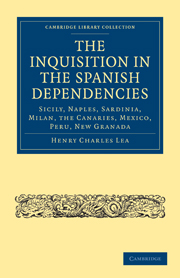 The Inquisition in the Spanish Dependencies
The Inquisition in the Spanish Dependencies The island of Sicily, in the fifteenth century, was a portion of the dominions of Aragon. Like the rest of the possessions of that crown, it had enjoyed the benefits of the old papal Inquisition under the conduct of the Dominicans, but, as elsewhere, towards the close of the Middle Ages, the institution had become nearly dormant, and at most was employed occasionally to wring money from the Jews. An effort to galvanize it, however, was made, in 1451, by the Inquisitor Fra Enrico Lugardi, who produced a fictitious decree, purporting to have been issued in 1224, by the Emperor Frederic II, granting to the inquisitors a third of the confiscations, together with yearly contributions from Jews and infidels; this was confirmed by King Alfonso of Naples, and again, in 1477, by Ferdinand and Isabella. When, in 1484, the Spanish Inquisition was extended to Aragon, Ferdinand did not at first seek to carry its blessings to his insular possessions. February 12, 1481, he had appointed Filippo de' Barbari, one of his confessors, as inquisitor of Sicily, Malta, Gozo and Pantelaria, who apparently did nothing to further the cause of the faith, for Sixtus IV, in letters of February 23, 1483, to Isabella, complained of the prevalence in the island of the same heresies that pervaded Spain; to repress these he had issued sundry bulls, which had proved inoperative in consequence of the opposition of the royal officials, to his no little grief.
To save this book to your Kindle, first ensure [email protected] is added to your Approved Personal Document E-mail List under your Personal Document Settings on the Manage Your Content and Devices page of your Amazon account. Then enter the ‘name’ part of your Kindle email address below. Find out more about saving to your Kindle.
Note you can select to save to either the @free.kindle.com or @kindle.com variations. ‘@free.kindle.com’ emails are free but can only be saved to your device when it is connected to wi-fi. ‘@kindle.com’ emails can be delivered even when you are not connected to wi-fi, but note that service fees apply.
Find out more about the Kindle Personal Document Service.
To save content items to your account, please confirm that you agree to abide by our usage policies. If this is the first time you use this feature, you will be asked to authorise Cambridge Core to connect with your account. Find out more about saving content to Dropbox.
To save content items to your account, please confirm that you agree to abide by our usage policies. If this is the first time you use this feature, you will be asked to authorise Cambridge Core to connect with your account. Find out more about saving content to Google Drive.